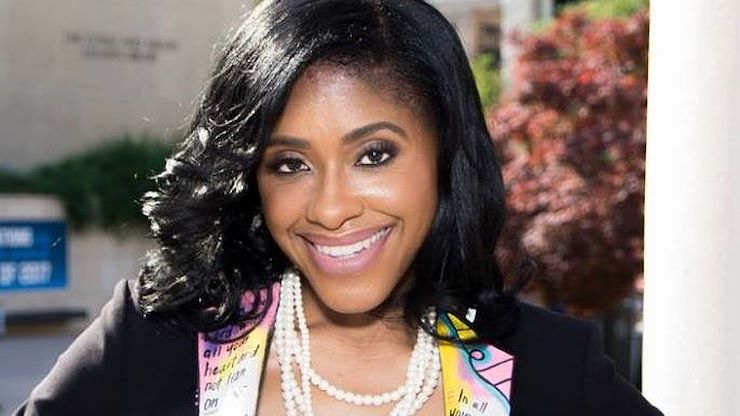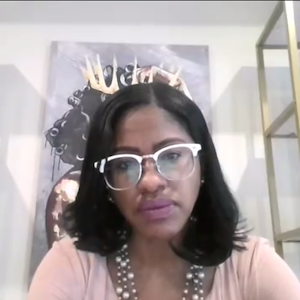
Dr. Maranda C. Ward, Assistant Professor of Clinical Research and Leadership at George Washington University’s School of Medicine and Health Sciences, led two virtual lectures on racism in the medical community as part of the Lively Arts Series presentation "Racism in America."
Following the success of last year’s seven-part lecture series, Montgomery County Community College and the Lively Arts Series presented the return of the Richard K. Bennett Distinguished Lectureship for Social Peace and Justice Series “Racism in America: Understanding Medical Racism and Its Impact on African Americans and Indigenous People in the 20th Century.” This year’s series focuses on how racist policies and practices in the medical community are systematically engrained into the treatment of people of color
 Dr. Maranda C. Ward, Assistant Professor of Clinical Research and Leadership at George
Washington University’s School of Medicine and Health Sciences, led the first two
sessions in the series starting Wednesday, Feb. 23, with “What Is the History of Medical
Racism in the 20th Century, and How Did Medical Racism Impact African American Communities?”
The session examined how colonialism in America began the foundation work of scientific
racism and white superiority.
Dr. Maranda C. Ward, Assistant Professor of Clinical Research and Leadership at George
Washington University’s School of Medicine and Health Sciences, led the first two
sessions in the series starting Wednesday, Feb. 23, with “What Is the History of Medical
Racism in the 20th Century, and How Did Medical Racism Impact African American Communities?”
The session examined how colonialism in America began the foundation work of scientific
racism and white superiority.
Ward began by emphasizing the fact that race is a social construct, not a biological construct. Further, racism is a form of structural violence and an ongoing public health crisis.
“Racism unfairly disadvantages some and unfairly advantages others, which we call white privilege,” she said. “It’s a waste of human resources. Race as a system persists in the absence of actors who hold racist beliefs. It creates a culture of whiteness that no one questions.”
Ward described how the supposed “scientifically proven” inferiority of Black, Indigenous, People of Color (BIPOC) populations provided Europeans with the rational and moral justification for slavery, establishing both scientific racism and white saviorism. Across history, Ward said, there are examples of pseudoscience to support treating BIPOC populations as inferior. Georges Cuvier, known as the father of paleontology, routinely performed dissections on the bodies of Black people, including Sarah Baartman, and paraded their bodies in “freak shows” without their consent. He was one of many racial scientists at the time, who subscribed to the pseudoscientific claim that skull size was a measure of intelligence.
The skull size theory had a profound impact on society. It led to the belief that BIPOC populations should be controlled through eugenics. In fact, the skull size theory was so convincing, that the U.S. Supreme Court used it as fact to rule in the 1927 case of Buck v. Bell that the Commonwealth of Virginia had the right to compulsory sterilization of inmates in public institutions who were deemed unfit.
Justice Oliver Wendell Holmes Jr. wrote the majority opinion. In it he said, “It is better for all the world, if instead of waiting to execute degenerate offspring for crime, or to let them starve for their imbecility, society can prevent those who are manifestly unfit from continuing their kind.”
Ward also cited the Tuskegee experiments where in 1932, BIPOC soldiers were given syphilis without their consent and experimented on for decades, without treatment from drugs like penicillin. It wasn’t until public outrage in 1972 that the unethical study was finally shut down.
“That wasn’t that long ago,” said Ward.
Some of the pseudoscientific beliefs from the 19th and 20th centuries about BIPOC populations continues to be seen today, said Ward. A 2016 study on pain assessment of Black and white patients “found a third of 222 white medical students and residents surveyed” still held the false belief that Black people have a higher tolerance for pain because they have supposed thicker skin.
Ward then returned Wednesday, March 2, for the follow-up session, “What Are We Doing Today that Proactively Destroys Medical Racism Moving Forward?” This session discussed the impact scientific racism has had on modern medical research and practices. It distinguished between the impact and legacy of medical racism on the trust and willingness of Black and Indigenous communities to participate in medical research and antiracism efforts.
Following a recap of the previous week’s lecture, Ward focused on what medical schools are doing to try to dismantle their racist legacies.
The Association of American Medical Colleges (AAMC) released a statement in June 2021 saying, “we must acknowledge and speak out against all forms of racism, discrimination, and bias in our environments in our institutions, communities and society.’ Efforts to change are long overdue, and we must all work together to make this change happen.” With the statement, Ward said the AAMC listed its four pillars in the framework to achieve this goal including: individual self-reflection of systemic racism, anti-racism efforts within the AAMC, antiracism efforts within the academic medical community and anti-racism efforts within the broader community.
These pillars she said are what being anti-racist looks like.
“Be comfortable or get comfortable talking about race and racism,” she said. “It’s so important. Racism is under the radar. It’s subtle. It creeps into workplace cultural. Racist policies lead to racial inequities. It’s time to address the policy. Racial bias is baked into policy. That’s what anti-racist change looks like.”
Lastly, Ward pushed for race conscious professionalism calling for more Black faculty, researchers, mentors and leaders in medicine to help address historical exclusion of Black professionals.
The Racism in America series concluded this year with the third and final session “Hearing and Healing: A Reflection on the Racism in America Series,” presented by Dr. Keima Sheriff, Dean of Holistic Support, Friday, March 11.
